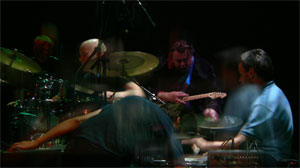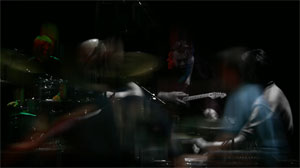
Norwegian Voices
Barbican
8th December 2005
The first delight of the evening was an unnamed trio featuring Berit Opheim, Karl Seglem and Stale Storlokken. Seglem’s amazing upper register tones on saxophone mingled with Opheim’s ululating, almost-not-there vocals. Storlokken meanwhile gently applied a silver tarnish to the ensemble sound. The result alternately tickled and pricked at the inner ear. In the second passage of their progress they dived into the middle registers, Seglem swooping, swallow-like into a brief sea of breath and spittle. Later, Opheim soared skyward again as Seglem teased earthbound spirits from his crescent-shaped goathorn. Here was the darkness of long nights under an ever-vigilant moon; their single, extended piece culminated in a hard-won joy, Storlokken’s contributions were delightfully left-field, conjuring the image of embers tossed back into a fire. They were a shorn trio, rich in magic and unexpected drama.
The smiling and slightly other-worldly Terje Isungset slowly scraped stone against stone. In so doing, he created an ancient sound, redolent of glacial movement or the age-old milling of grain. A quicksilver twinkle emanated from a mouth-gripped tube that gave Isungset an elephant-like visage. He then seated himself at a small drumkit and proceeded to conjure vivid thunder, his movements reminiscent of a ceremonial eastern dancer. A deep, thrumming roar became increasly intense. It was without doubt the sound of stampeding cattle passing in dangerous proximity. Isungset’s music was a force of nature whose tempo-less tempo threatened to sweep the listener away. Just as birdsong and wind and rain bear their own rhythms, so too with Terje Isungset.
Mari Boine comes from the Sámi people who inhabit the land north of the Arctic Circle, the bridge that joins Norway, Sweden and Finland. Her sighs and whispers approached weeping entreaty. Hers was a free spirit burdened with the knowledge of suffering. The music she created with her band verged on a primal melding of earth and sky. She brought the horizon before the eye. Thomas Stronen and Iain Ballamy are one half of the (possibly) now defunct Food. Ballamy played treated sax with Stronen’s nimbly tense percussion. The latter was an education, delivering intensely detailed rhythminformation, revealing new panoramas moment by moment. This was 21st century jazz (a cliché I know, but for once this really sounded like it). It was genre surfing, edgy, self-sampling, (hyper)active, replete with looming/booming b-lines. The outcome was fractal, self-digesting, grin-inducing.
Joined by veteran guitarist Terje Rypdal, Supersilent launched the evening into a star-speckled night. In full effect they resembled a power station vibrating free of its foundations and rising into the air. They exhumed the spirit of Joseph Beuys, becoming an organic generator, intensely electric. Rypdal, who had guested at least once previously with the quartet, looked alternately puzzled, lost and transfixed. His contributions were a mixture of successful intervention and brave failure, such willingness to experiment was entirely welcome. The quintet’s progress was punctuated by what seemed like half the audience evaporating away. Those that remained were blessed with a noisy, ragged and ultimately glorious set.
